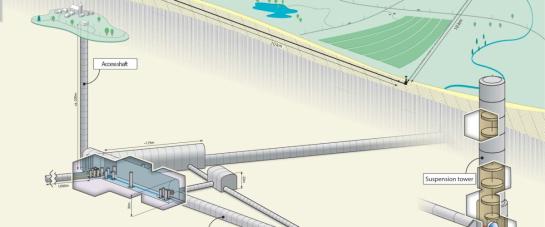
Yesterday, the European Strategy Forum on Research Infrastructures announced that the Einstein Telescope project will be part of a short list of priority projects in Europe: https://www.esfri.eu/latest-esfri-news/new-ris-roadmap-2021. Our country, together with Italy, the Netherlands, Spain and Poland, is at the basis of the Einstein Telescope project and supported its candidacy in the ESFRI selection process. Our country will continue to play a leading role and is already investing in numerous preparatory R&D projects.
The Einstein Telescope (ET) is a large-scale international research infrastructure that will study the universe using gravity waves for half a century. The laboratory will be largely underground, encompassing a complex of 30 km of tunnels in the shape of an equilateral triangle. The technology used is groundbreaking and trans-disciplinary. The ET project is currently enjoying a great deal of interest in Europe and even beyond, there are currently dozens of academic institutions and research laboratories from more than 10 European countries that are willing to support the project scientifically, politically and financially.
Flanders, together with Wallonia, the Netherlands and Germany, plays a pioneering role in the ET project. A strong commitment from the Flemish government can increase the chances that the ET project will be realized in the region of the three-country point Belgium -Netherlands-Germany.
With its successful positioning on the roadmap of the European Strategy Forum on Research Infrastructures (ESFRI), a very important milestone has been achieved. In Flanders and by extension in Belgium, we have been working for more than four years to put this project on the academic, technological and political map. We are therefore involved in the cradle of this project and are active in the field of gravitational waves research in terms of theory/computation, instruments and data interpretation. The realization of the Einstein Telescope, partly on our territory, could, in addition to the enormous international prestige, also give a major boost to fundamental physics research in Flanders. This high-tech instrument is also a driver for technology and industrial development in many crucial areas such as new materials, cryogenic temperatures, vacuum technology, optics and photonics, quantum technology, computer technology and artificial intelligence. The project will enable the training of a new generation of scientists and engineers in the field of gravitational wave problems, and more broadly in all related fields, thus contributing to the building of world-class knowledge in all regions.
Now that we have the seal of approval from Europe, the nominating countries of the Einstein Telescope project (currently the Netherlands, Italy, Belgium, Poland and Spain) will have to take a first step towards pre-financing the project. This will be accompanied by the publication of a so-called "bid book" (to be negotiated in the period 2021-2024) containing the main cost items of the project, for which countries and regions will bid, with or without counter conditions. In conjunction with this process, a site selection procedure will be decided upon, whereby the geophysical characteristics of two candidate host regions, Sardini and the three-country point (Meuse-Rhine Euroregion), together with socio-economic factors will lead to a final decision on the location of the project by the end of 2024.
The VUB, in close collaboration with the UAntwerpen, the UGent and the KULeuven, has been engaged in this challenging and fascinating project for several years. The Strategic Research Project "HEP@VUB" at the Department of Physics and Astronomy and the Photonics Research and Innovation Center "B-PHOT" are actively involved in both the technological and scientific aspects of this project. At the end of March 2020, our rector Caroline Pauwels signed the letter of intent "On supporting the preparations toward the establishment of `Einstein Telescope (ET): 3rd Generation Gravitational Wave Observatory'" with which the VUB belongs to the founding members of the ET Consortium. The VUB is also one of the leading participants in the ETpathfinder project, an important R&D facility for ET currently under construction in Maastricht, which, besides funding through the Interreg Vlaanderen-Nederland, also benefits from co-funding by the Flemish Government and the VUB.
Image by Einsteintelescope.nl
